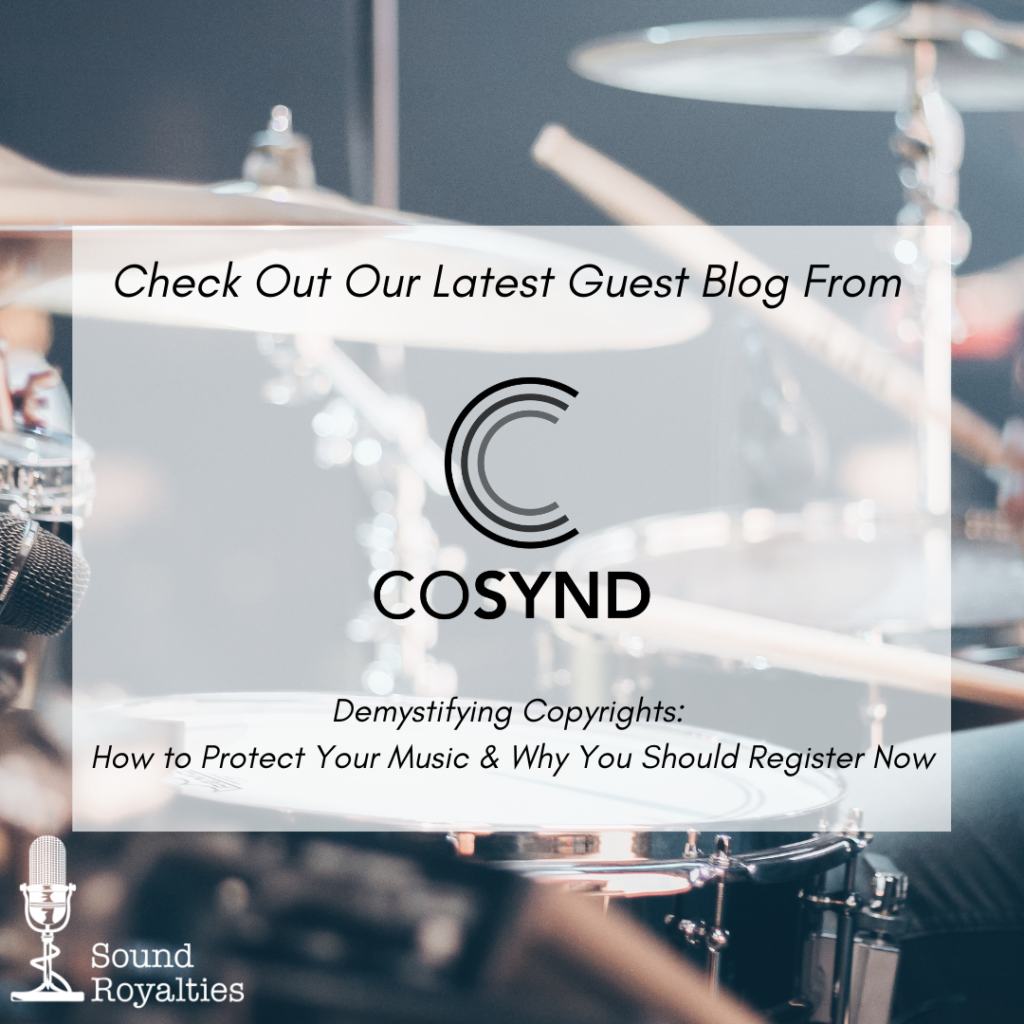As a music creator, you put a lot of time and effort into your creations. Your songs, recordings, and compositions are your intellectual property. But when you share them with the world to make money from your catalog of work, copyright protection in the music industry is essential. Since royalty streams are the lifeblood of any artist, songwriter, or producer, it’s important that you protect these assets. That’s why Sound Royalties has teamed up with Cosynd to offer customers access to simple, affordable copyright registrations with the U.S. Copyright Office (USCO).
What is a copyright in the music industry?
Let’s start with the basics. Copyrights are a way for music creators to signify ownership over their original works. It also gives the copyright owner exclusive rights, like the right to reproduce, distribute, create derivative works of, publicly perform, and/or publicly display their work. Copyright owners also have the right to authorize others to do the same.
Copyrights in the music industry generally fall into two categories: composition and sound recording. The composition refers to the music and the lyrics of a song and is usually owned by the songwriters and/or publishers. The sound recording refers to a particular recorded version of the music and lyrics. These copyrights are usually owned by artists and/or labels.
With Sound Royalties, you always retain ownership of your copyrights. We analyze music royalty streams and offer flexible terms and pricing through our royalty financing, while never compromising your copyrights, so you can keep your copyrights.
Why should you register your music copyrights?
Registering your copyrights with USCO puts you in control of your music by allowing you to protect your original content, control how it’s used, and/or make the call to file a lawsuit. Technically, a copyright exists the moment a work is created, but these copyrights aren’t necessarily protected or enforceable in the eyes of the law. A recent ruling by the United States Supreme Court determined that you must register your copyrights with USCO before filing an infringement lawsuit. Other types of registrations or mailing your music to yourself are not substitutes for USCO registration. Unfortunately, we currently live in a time where content being stolen or misused is common practice, and recent cases have been dismissed because the work was not registered with USCO beforehand. Early registration can grant you $150,000 in statutory damages per willful infringement and attorney fees.
Registering with USCO provides you with many additional benefits:
- You create an established public record of the ownership of your work.
- You receive physical proof of your registration in the form of a certificate.
- You gain the ability to file an infringement suit, if needed. At the court’s discretion, this ability could yield up to $150,000 per work if the infringement is deemed deliberate.
- You may be eligible to recoup attorney’s fees from litigation.
- The registration is considered factual evidence in a court of law if filed within 5 years of publication.
- You can record the registration with the U.S. Customs Service to protect against the importation of infringing copies of the work.
Register BEFORE a problem occurs.
Registering after your work has been stolen or misused means your legal proceedings cannot begin until you have received official registration from the USCO. This can take 3-9 months on average. In addition, you will only be able to receive a max of $200-$30,000 per work.
What if you don’t live in the U.S.?
Music knows no borders. Even if you are not based in the United States, most copyright infringements occur within the U.S, which is why creators from anywhere across the world should consider registering with USCO for substantial.
There is no such thing as an international copyright that will automatically protect an author’s work throughout the world. Fortunately, the United States has copyright agreements with most countries through treaties, such as the Berne Convention, that require each country to honor the other country’s own nationals’ copyrights for music.
What if you worked with collaborators?
In today’s music industry, a work is rarely created by one person. If you work with a collaborator (or collaborators), each person owns a portion of the work. Under U.S. copyright law, each participant automatically owns an equal share of the copyright and income, no matter how much or how little they contributed – unless there is a copyright agreement in place.
Documenting ownership of your works is one of the most important steps you can take when protecting your work. Making sure that each collaborator’s role and ownership stake is clearly lined out can save you a lot of time and money in the long run.
Why use Cosynd to protect your copyrights
We have teamed up with Cosynd so that Sound Royalties customers can file their copyright registrations in minutes, for all their content — music, videos, images, literature, and more — at a discounted price of $25 per registration application (plus federal filing fees). This is nearly 80% less expensive than similar services. What used to be an extensive, time-consuming process can be done in just a few clicks using Cosynd.
In addition, Sound Royalties customers who work with collaborators can create, negotiate, redline, and execute vital documents. These documents control who owns what part of the music and how the music is used, including producer, collaboration, and work for hire agreements, and split sheets, all using Cosynd’s unique step-by-step tool.
Thousands of music creators from over 120 countries around the world have used Cosynd to gain control over their copyrights and register them with USCO. They choose Cosynd because it is a fast and affordable way to register your copyrights and create other essential agreements.
Get started today!

